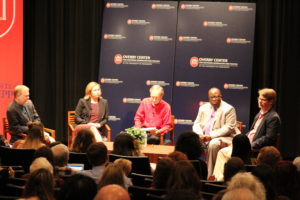
Four prolific Mississippi-based journalists discussed continuing their professions in a largely Republican state at a time of increased hostility toward the press at a 2017 SEJC panel held in the University of Mississippi’s Overby Center for Southern Journalism Feb. 17.
Titled “Assault on the Media,” the panel featured Jerry Mitchell, an investigative reporter with the Jackson Clarion-Ledger; Marshall Ramsey, an editorial cartoonist for the Clarion-Ledger and radio host; Kate Royals, an education reporter for Mississippi Today; and Ronnie Agnew, executive director of Mississippi Public Broadcasting discussed the current state of distrust towards the news media on both a local and national scale.
Bill Rose, senior Overby Fellow for the center, first asked panelists about President Donald Trump’s 77-minute press conference that occurred two days prior, during which the commander-in-chief claimed the media are no longer trustworthy.
Agnew, erstwhile executive editor of the Clarion-Ledger and four-time Pulitzer Prize judge, said with every tweet, Trump weakens his own power.
“I think it plays well in some parts of the country, but I believe that when you cry wolf as many times as the president has with the media in 6 a.m. tweets, people with brains can start to decipher for themselves what is news and what is not,” he said.
Ramsey, an editorial columnist whose work has appeared in the New York Times, Clarion-Ledger and USA Today, said members of the media must also face “trolls,” or people who make contentious statements for shock value, who have been “emboldened” by the polarizing national discourse.
Mitchell said regardless of what subject matter reporters cover, journalists must exercise caution, especially in a time when objective journalism may fall prey to U.S. public opinion, which he said is “splintering” in wake of polarizing news media outlets such as Fox News and MSNBC.
“We have to pick our battles as journalists,” he said. “I think the more important battle is truth, and the more important battle is reporting on things.”
Agnew said the press should consider what it misses when reporting; he noted that the press missed covering Trump when it missed speaking to community members.
“How did we miss Donald Trump?” he asked the crowd of around 130 students and collegiate faculty members. “How did we miss this discontent of the country that would put Donald Trump in office? I think because we weren’t watching. We covered the incendiary things that he said … We didn’t cover the people who were actually embracing his message.”
He advised the audience to “cover the people” instead of “covering the celebrity.”
Ramsey, meanwhile, said journalists should take note of who they follow on social media, as well as avoid creating an “echo chamber” of concurring opinions on their feeds.
“We can all now go safely into our little news bubble and we can get a la carte news how we want it, when we want it, what we want to hear,” Ramsey said. “I’ll sit there and read different views on my Facebook feed from different people and (will think) ‘Wow, did they watch the same thing I watched?’ Then I realize that they were watching a different news source than I was watching.”
The panelists also discussed covering Mississippi, which Mitchell said has poor records laws. Mitchell, a Pulitzer Prize-nominated investigative reporter with the Clarion-Ledger whose work has prompted four Ku Klux Klansmen’s convictions, said developing sources is crucial to community reporting.
Royals agreed.
“There’s constantly roadblocks — people are never going to make it easier for you to get what you’re trying to get,” she said. “You just expect it.”
Brian Blakely, a senior mathematics student from Louisiana Tech University and photographer for the university’s newspaper, said although he is not a journalism major, the panel spoke to what he sees his coworkers experience.
“It’s still interesting to see and hear the stories of people and the trouble’s they’ve had then and how things have changed over time,” he said.
